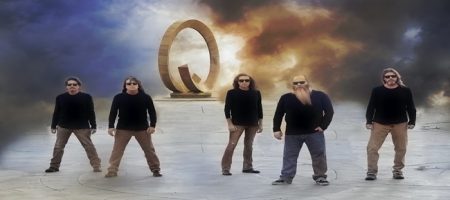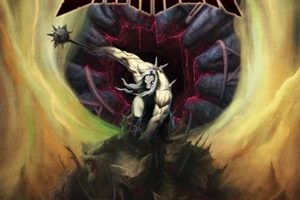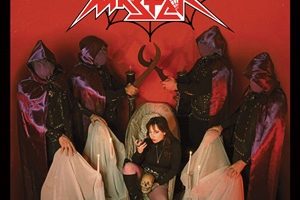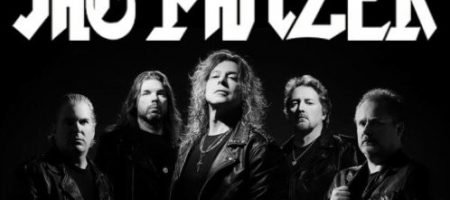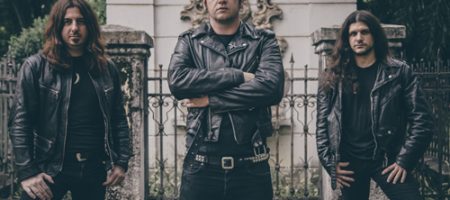Jag Panzer – Striking Variety
Wednesday, 27th September 2017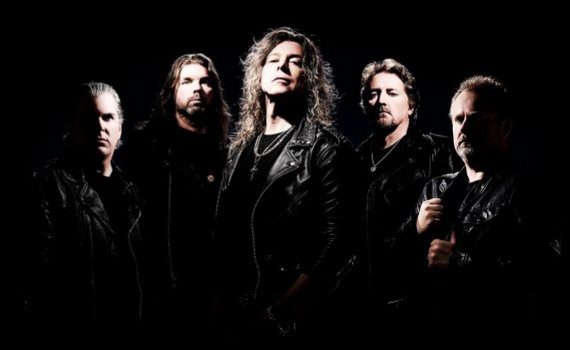
As a connoisseur of the metal genre for decades, you get to see the rise and fall of many styles – or the steadfast appreciation and dedication towards others. While not necessarily as cool or hip as it may have been during the late 1970’s to late 1980’s, traditional power metal consistently delivers the sense of strength and community many seek and savor. The transformation from its early beginnings with Rainbow and Black Sabbath to Iron Maiden, Judas Priest, Saxon, and Accept infected the US marketplace – which brings us to one of the early pioneers hailing from Colorado, Jag Panzer.
Formed back in 1981 as Tyrant, they decided to rename themselves after a World War II German armor tank from a book they discovered in the library. Their debut album Ample Destruction instantly put them on the map, through infectious power anthems chock full of sturdy guitar riffing, proper bass support, and the incredible, majestic delivery of Harry Conklin that gained him ‘The Tyrant’ nickname. Over the course of the next 36 years, you’ll discover the band experienced uncertainty while striving to achieve their goals – in the end coming out as a legacy group with a varied, but distinct discography that includes the critically acclaimed The Fourth Judgement and Casting the Stones, as well as the much-maligned Dissident Alliance.
After thinking about putting the band to rest a few years ago, Jag Panzer surprisingly had a change of heart to record their newest record The Deviant Chord – bringing back guitarist Joey Taffola to the fold along with the classic lineup since 1987 of Harry, guitarist Mark Briody, bassist John Tetley, and drummer Rikard Stjernquist. It’s another versatile barnburner, chock full of heavy metal that can be harmony driven for “Born of the Flame”, speedy for “Salacious Behavior”, or even epic in a doom ballad sense for “Long Awaited Kiss”. Seeking out Mark for a Skype chat, this conversational yet informative interview tackles the resurrection of the band, how an old Irish classic finally makes a Jag Panzer record, the festival market scene, and how he views the changing tides of metal, using his children’s consumption habits as a model.
Dead Rhetoric: Considering you put the band to bed for a couple of years, what circumstances or events led to the decision to keep Jag Panzer active once again?
Mark Briody: I guess the biggest was, even when we put the band to bed I still didn’t get a break. There was still business to be done all the time- specifically the re-issue of four different records. A lot goes into reissues- gathering the original master tapes, finding a studio that can transfer the original analog masters, finding the original artwork – I mean, that was a ton of work. I guess I had assumed when the band went on hiatus, I’d get a break also- and that was not the case. Here I was doing all this work, and no band to play with, nobody to record songs with, it was terrible. So, I was glad we got back together.
Dead Rhetoric: How was the process writing and recording The Deviant Chord this time around? Do you feel like your duties expanded as Joey Tafolla came back into the fold – and where do you think this record sits style-wise in your discography?
Briody: With Joey back, we decided to do something a little bit different. We were thinking back to how we (recorded) when he originally joined the band, and what we did back then was a lot of demos and refining the demos – so we figured we would try it this way again. I started off with completed versions of all the songs- playing all the instruments, a drum machine with the drum parts being pretty bad, generic bass parts, record them and deliver them to the band. Harry would get involved then, he threw a lot of ideas into the music, arrangements and changing parts. That meant Harry and I came up with our own set of demos, and these were much better than the first set. Then Joey, John, and Rikard started getting involved, and refine it even further to make things better. When we got ready to record the album, some of these songs we had demoed five or six times.
We don’t typically do that- we hadn’t done that for the past few Jag Panzer albums. It gives us a little different sound.
Dead Rhetoric: Which songs took the biggest transformation from the initial demos into the final song?
Briody: The second to the last song, “Fire of Our Spirit” took so many transformations- Harry changed it up again at the very last minute. We are recording the real album, we are ready to go into a real session- he wanted to change this, this, and this- and his ideas were fantastic. Normally I would shut that down immediately, that’s ludicrous at the eleventh hour to make changes like this. We called our drummer and told him I was going to spring a change on him, and he was supposed to record tomorrow. There was some resistance until everyone heard what Harry had in mind, it was really good that he did that. It took the song to the next level.
Dead Rhetoric: Who decided that tackling the Irish classic “Foggy Dew” would be perfect for the new record? And how much of a tongue twisting exercise was it for Harry to get a lot of the phonetics and words sung properly – it reminded me of what happens in “Africa” by Toto or “To Tame a Land” by Iron Maiden?
Briody: Yeah, that was my idea. I came up with that arrangement years ago, my dad used to sing that song around the house. By the time I was 18 or 19 I had the arrangement of how that song should go in my head, as a metal version. We couldn’t really find a place to put it, until this album I started hearing band members using the word variety a lot – like this album has a lot of variety on it. That sparked on the idea, so let’s throw this on here, this Celtic song with a melody from the 1800’s and the lyrics from the 1900’s- the event happened in the late 1910’s. That gave me the space to put this in.
On the early demos for this, it was definitely problematic to do the vocals. Harry is a great singer, he can sing everything, but the phrasing is not typically the way he would sing a song. We put a lot of work into this- we probably did about five or six different passes at this for the demo stage over three weekends- something that was faithful to the original melody, but still his style. I think we finally got something at the end of the demo stage and he practiced it for a few weeks before the real album recordings.
Dead Rhetoric: Did you enjoy putting together the lyric video for “Far Beyond All Fear” – given your strong skills in the computer field? As it seems that you also going to be doing work in that arena for other artists like Jack Starr, correct?
Briody: Yeah- I don’t know if enjoy is the right word- it’s a lot of work, a lot more than people think. Sometimes it’s just hours getting one small look right. It keeps my graphic chops up. Just like playing the guitar, you have to keep your chops up- it’s important for me to keep my graphic skills up because there is a lot to it- it’s fairly involved. It’s a thankless job though- no one notices lyric videos, almost no one- for most people they are just window dressing to hear the song and I understand that. I know the song is the important thing, but it’s a little deflating to work for three weeks on a lyric video, put in about 120 hours and no one notices it. But I think they would notice it if it was bad. It’s getting people to watch the videos, our video counts are far exceeding the record company’s expectations so it’s all good.
Dead Rhetoric: It could be beneficial though for the non-English speaking listeners to be able to experience these lyric videos- as it can sometimes be harder for them to understand English compared to native English speakers…
Briody: Wow, I never even considered that- but you are correct. That has to be a huge bonus for non-English speakers. Especially Harry has a lot of inflections in his vocals, and it may not be as easy for people to pick out the words. I didn’t even consider that before, so that is a good benefit.
Dead Rhetoric: When it comes to Dusan Markovic for the cover, how does the process work as far as the band and artist – is it a back and forth development or do you trust his ability enough to get your vision across without fail?
Briody: Initially, I started looking for an artist about three years ago. I was looking for composition, color, drama – he was checking the boxes on everything. I also went to Comic Con (locally) and was talking to artists, and that was a nightmare. Here are these artists, paying to have a booth, and none of them were interested in me hiring them for anything. Literally, it was crazy – every one of them said, ‘Nope- not interested.’ Some of them even cut me off half way through the first sentence. We lucked out, Dusan is actually better than all of them.
As far as working together, I gave him a broad concept of what I was looking for. The mad scientist, a Jekyll and Hyde, I wanted a scientist that was turning into a dinosaur, the back story about this expedition set in the same time period as Nikola Tesla, he had a laboratory here in Colorado Springs, so I wanted a nod to that. I gave him some broad direction, but he’s the mastermind behind the whole thing. It’s a great cover, and it’s all on him.
Dead Rhetoric: Have you always enjoyed working with different artists – as it seems that you’ve chosen different people each time rather than sticking to one artist, a la Iron Maiden with Derek Riggs for so many years?
Briody: I like to see the different artists interpretations of my ideas. You don’t usually have someone else interpret your ideas. It would be like if I wrote a song for another band and I gave it to them and see what they did with that. I’ve never done that so I’ve never experienced that. This gives me something where I can give an idea and see someone else interpret it- and I’ve gotten some cool interpretations. Travis Smith did a cover, Mattias Norén (also), I’ve worked with some really good artists and it’s been a good experience. I’ve never had a bad experience with an artist which is great- I’ve talked to some other bands that have, but I’ve worked with some professionals.
Dead Rhetoric: You’ve often been asked to perform special ‘nostalgia’ sets at well-known festivals in Europe like Keep It True or specific shows in Greece. Does fear ever set in that promoters and audiences aren’t as receptive to your new material as they may be to the classics?
Briody: (laughs). I bring them kicking and screaming into the new material. I hate doing the nostalgia sets- I love Ample Destruction and I’m proud of that album. But it’s an artistic dead end. The only times we’ve done it were for friends of ours- Oliver who runs the Keep It True festival in Germany, and we’ve done it for Greek promoters like Manolis, they are both friends of ours and have been supportive of the band for years. We made an exception for those guys, the full Ample Destruction set, and it went over pretty good.
My comment about kicking and screaming. Years ago, we were playing Wacken for the first time, and I had a German metal journalist who looked at our set. He said the songs on this set, like “Iron Eagle” and “Chain of Command”, anything that wasn’t off Ample Destruction– he said we would get no response from the audience. And he was wrong- we got a great response, everybody was singing along. People sang along to those songs, and I recognized that they are great live songs and I continue to play them live. They’ve become an integral part of our set- and I think I’m going to have to do that with our new material. For some reason, with our music, it takes years for it to gel- I’m going to have to pick some songs from the new album and say, these will go over good live, and start playing them all the time until people recognize them- and they will.
Dead Rhetoric: I agree. It amazes me when people argue about Iron Maiden playing so much new material, or when Rush did it as well. To be a vital artist, isn’t the point to be able to promote and play your newest record material live?
Briody: I applaud Rush and Iron Maiden for doing that. My favorite Rush era is probably early to mid-period Rush but I think it’s great that they always play new material. You have to be a viable band, you don’t want to be a nostalgia band. That’s a limited market. The nostalgia metal festivals are great- the crowds are incredible, the fans are great, it’s an incredible experience- but there are only so many of those, and you can’t play those (festivals) every year. I want to be a band that plays everywhere, to all different kinds of crowds, and you have to have new music to be able to do it.
Dead Rhetoric: When you look back on your career, do you think there are specific forks in the road or circumstances that changed the course of where you stand in the annals of metal history compared to other acts?
Briody: Yes. I think the best fork that was a mistake for us was after Ample Destruction came out, we had enough new material ready for another album within a year to a year and a half. The material that ended up being released as Shadow Thief, we had label interest from Combat as well as interest from labels (such as) Warner Bros. and other major labels that would come out to Colorado to see us. We really held out for those big deals, which in retrospect was a terrible mistake. We should have just set a deadline and said we are going to release the album on whatever label, no matter what happens.
A fork in the road to the positive, and people are going to think I’m crazy but hear me out, was Dissident Alliance. It was an absolute failure and most fans hate it, but that really gave us a taste of how to deal with failure and move forward. It solidified in my mind that my bandmates- the ones in the band at the time, John and Rikard, that they were interested in going forward with this band no matter what. That put us in the right mindset for me to write The Fourth Judgement and release that album.
Pages: 1 2











